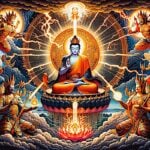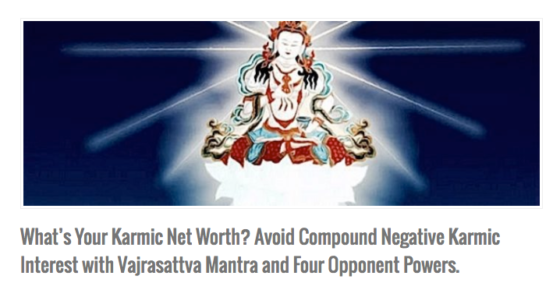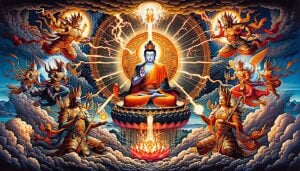Happy Chinese New Year — Year of the Fire Rooster 2017
From our team at Buddha Weekly, we wish you Happiness, Good Fortune and Good Health in 2017.
Chinese New Year, following the Lunar calendar, typically falls a month or so (it varies) after solar Western New Year, and almost one month before Losar (Tibetan New Year — which this year is on February 24, 2017).
A Time to Purify?
Several traditions have become associated with Chinese New Year, most famously the “lucky packets” — little red envelopes filled with money. It is also a time to purify and try to encourage good luck in the New Year through positive resolutions, similar to Western New Year’s resolution.
In some Buddhist traditions, for weeks or days running up to New Year’s, it is considered beneficial to purify negative karmas lingering from the previous year. By doing so, we don’t carry the burden into the new year.
Vajrasattva Practice
In Tibetan traditions, this might mean reciting hundreds or thousands of Vajrasattva mantas. Vajrasattva, the Buddha of Purity, who — if engaged with the four opponent powers — helps us purify all negative mental and physical karmic imprints.
Whether Buddhist or not, the four opponent powers are easily acknowledged as an “effective” method, from both a human — and a psychological — point of view, to remedy the harm caused by negative actions. The opponent powers, as described by Venerable Thubten Chodron, are:
- Regret: not to be confused with guilt. We acknowledge our responsibilities.
- Restoring the Relationship: After acknowledging, we restore our vow to not harm through taking Refuge and altruistic activities.
- Determination Not to Repeat: we make a promise to ourselves.
- Remedial Action: we try to mitigate or fix the harm. This can be apologies, altruistic acts, and purification practices such as Vajrasattva
More in this feature on Karma and Vajrasattva>>
More articles by this author

Happy Birthday Venerable Zasep Rinpoche: May the pure white light of your peerless wisdom shine undiminished until the end of existence

Khenpo Karthar Rinpoche “has gone to dance with the Dakinis”; a teacher “rarer than a star in the midday summer sky” has passed

A rare chance to honor Buddha’s relics in New York state: 3-day exhibit of Holy Relics at Thekchen Choling
Search
Latest Features
Please support the "Spread the Dharma" mission as one of our heroic Dharma Supporting Members, or with a one-time donation.
Please Help Support the “Spread the Dharma” Mission!

Be a part of the noble mission as a supporting member or a patron, or a volunteer contributor of content.
The power of Dharma to help sentient beings, in part, lies in ensuring access to Buddha’s precious Dharma — the mission of Buddha Weekly. We can’t do it without you!
A non-profit association since 2007, Buddha Weekly published many feature articles, videos, and, podcasts. Please consider supporting the mission to preserve and “Spread the Dharma." Your support as either a patron or a supporting member helps defray the high costs of producing quality Dharma content. Thank you! Learn more here, or become one of our super karma heroes on Patreon.
Lee Kane
Author | Buddha Weekly
Lee Kane is the editor of Buddha Weekly, since 2007. His main focuses as a writer are mindfulness techniques, meditation, Dharma and Sutra commentaries, Buddhist practices, international perspectives and traditions, Vajrayana, Mahayana, Zen. He also covers various events.
Lee also contributes as a writer to various other online magazines and blogs.
















